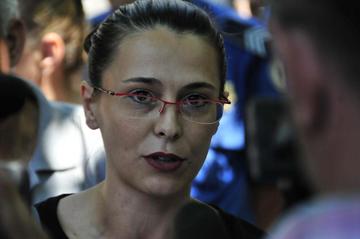
An ongoing smear campaign launched by Belgrade-based daily newspaper Informer against prominent Montenegrin activist Vanja Ćalović has sparked indignation and criticism
Around 100 journalists, civil society activists and politicians protested against the tabloid in Podgorica on Tuesday (June 24th), demanding the paper's closure, according to a BalkanInsight report.
Accusing Vanja Ćalović of involvement in bestiality, about a week earlier, Informer released video footage, claiming it provided proof that the head of the Network for Affirmation of the Civil Sector (MANS), which works on corruption and transparency issues, was "an animal abuser".
The EU and OSCE missions in Podgorica, as well as the US Embassy to Montenegro, condemned the tabloid's offensive campaign to discredit the activist in her country. While voicing support for media freedom, they described this type of reporting as irresponsible and improper, stressing the need for professional standards and journalistic ethics to be observed.
"This type of reporting characterized by such a personalized and highly offensive tone disrespects those professional standards in the lowest form," the OSCE mission said in a statement. "Such reporting makes the work of media self-regulation bodies' all the more necessary in effectively addressing unprofessional media reporting and maintaining respect for the highest journalistic standards."
The EU Delegation in Podgorica said it would continue monitoring the state of media freedom in Montenegro, which began its accession talks with the Union on June 29th, 2012. It also issued a warning to all countries hoping to join the 28-nation bloc.
"Freedom of media is an EU fundamental right, and a key pillar for a democracy. The European Union will accept no deviation from European Union standards on freedom of expression and media on the part of countries aspiring to join the EU," the delegation's statement read. "However, the freedom of media can also be threatened by the disrespect of professional and ethical standards."
Ćalović's case is one of the latest added on the mediafreedom.ushahidi.com website launched recently by London-based Index on Censorship and Italian think-tank Osservatorio Balcani e Caucaso to enable the reporting and mapping of media freedom violations across the 28 EU nations plus candidate countries. In less than a month, the two organizations have enlisted more than 120 verified instances of legal measures, physical violence, psychological abuse, defamation and various other forms of violation of media freedom that occurred in the surveyed countries since February.
This publication has been produced with the assistance of the European Union. The contents of this publication are the sole responsibility of Osservatorio Balcani e Caucaso and its partners and can in no way be taken to reflect the views of the European Union. The project's page: Safety Net for European Journalists.A Transnational Support Network for Media Freedom in Italy and South-east Europe.

 Tabloid's offensive campaign against Montenegrin activist condemned
Tabloid's offensive campaign against Montenegrin activist condemned




 All the contents on the Osservatorio Balcani e Caucaso website are distributed with a
All the contents on the Osservatorio Balcani e Caucaso website are distributed with a 